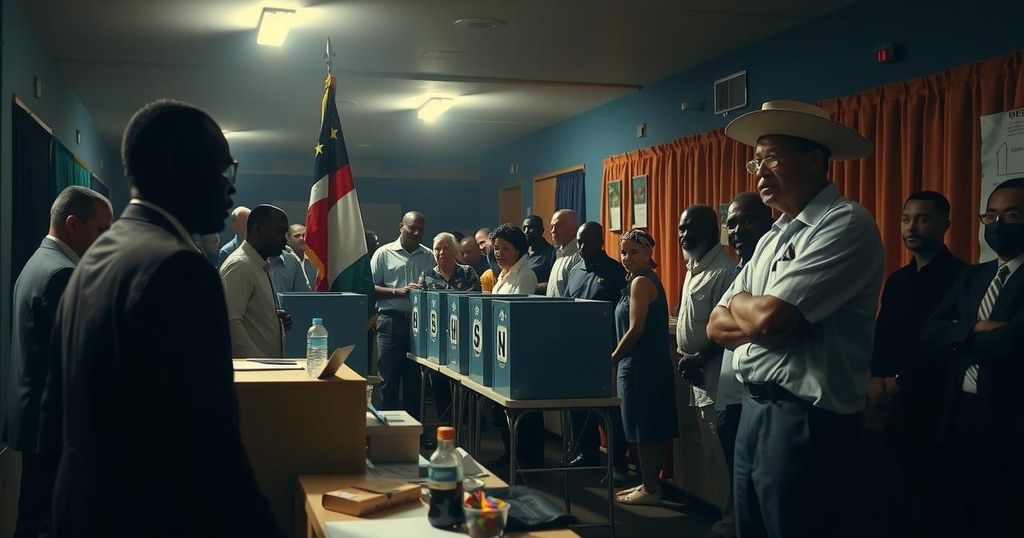Politics
AFRICA, ALLIANCE OF CHANGE, CHAGOS, CHAGOS ISLANDS, DEMOCRACY, ELECTION, ELECTIONS, ELECTORAL PROCESS, GOVERNMENT, INDIAN OCEAN ARCHIPELAGO, IRFAN RAHMAN, JUG, MAURITIUS, MILITANT SOCIALIST MOVEMENT, NATIONAL ASSEMBLY, NAVIN RAMGOOLAM, PARLIAMENTARY SEATS, PRAVIND JUGNAUTH, RAMGOOLAM, SOCIALIST MOVEMENT
Leila Ramsay
0 Comments
Mauritius Under Electoral Scrutiny Amid Phone-Tapping Scandal
Mauritius is conducting a parliamentary election amid a phone-tapping scandal, raising suspicions about electoral security. Police are present at polling stations as opposition parties warn of potential fraud. The election follows a significant territorial agreement regarding the Chagos Islands, but recent leaks have hampered Prime Minister Jugnauth’s re-election prospects. Concerns about governance and corruption persist, adding pressure to maintain democratic integrity.
Mauritius held a parliamentary election amidst a phone-tapping scandal that has raised concerns about the electoral process. Police were deployed at polling stations, as opposition parties warned of potential fraud in the elections of one of Africa’s most stable democracies. This election follows a significant agreement where Britain ceded sovereignty of the Chagos Islands to Mauritius. Prime Minister Pravind Jugnauth faced setbacks from the leak of recorded conversations among notable figures, which undermined his campaign for re-election. In light of the scandal, authorities implemented, then retracted, a ban on social media, further fueling worries over the country’s fading democratic principles. The election pits Jugnauth’s Militant Socialist Movement against the Alliance of Change led by former Prime Minister Navin Ramgoolam. Both factions are vying for control of the National Assembly’s 70 seats, with each expressing confidence in their ability to reduce poverty and improve living conditions. Ramgoolam noted, “There are risks of fraud today and we must remain vigilant,” urging voters to independently mark their ballots. As of midday, voter turnout was reported at 40 percent, which has raised questions about engagement compared to previous elections. Mauritius has historically exhibited political stability and economic growth; however, critics highlight a decline in institutional integrity and an increase in corruption during Jugnauth’s tenure. Notable scandals under his administration include allegations of procurement irregularities during the pandemic. Experts have voiced that governance concerns could jeopardize the nation’s reputation for political stability, as illustrated by its recent drop in the Ibrahim Index—an assessment of governance across Africa. Moreover, the political landscape has seen little change since independence, with leadership dominated by three prominent families. New campaigns, such as the Linion Reform alliance, challenge the status quo, advocating for transparency in governance and decrying oligarchic tendencies. While the Chagos arrangement represents a political victory for Jugnauth, skepticism lingers regarding US military interests on the island and its potential impact on bilateral relations. The election results, expected the following day, will prove pivotal in determining Mauritius’s democratic future and governance integrity.
The situation in Mauritius is reflective of broader regional political dynamics as the nation navigates democracy and governance issues. The recent phone-tapping scandal, which has attracted significant attention, raises questions not only about the integrity of the electoral process but also about the erosion of civil liberties in a nation often lauded for its stable democratic practices. The agreement surrounding the Chagos Islands marks a crucial geopolitical development that underscores the delicate balance Mauritius must maintain between domestic satisfaction and international relationships, particularly with nations like Britain and the United States. Historically, Mauritius has thrived on stability and development since its independence, but increasing concerns over corruption, nepotism, and governance standards pose severe challenges to its political landscape. The upcoming election serves as a critical juncture that could either reinforce or disrupt the trajectory of political and economic growth within the country.
The parliamentary election in Mauritius occurs under a cloud of controversy instigated by a phone-tapping scandal, endangering the fairness of the electoral process and the very tenets of democracy in the nation. As both main political factions compete for control of the National Assembly, the outcomes may redefine Mauritius’s political landscape and democratic integrity. Concerns regarding governance and corruption remain prevalent, necessitating vigilance from not only political entities but also the citizenry engaged in this electoral process.
Original Source: www.bryantimes.com




Post Comment